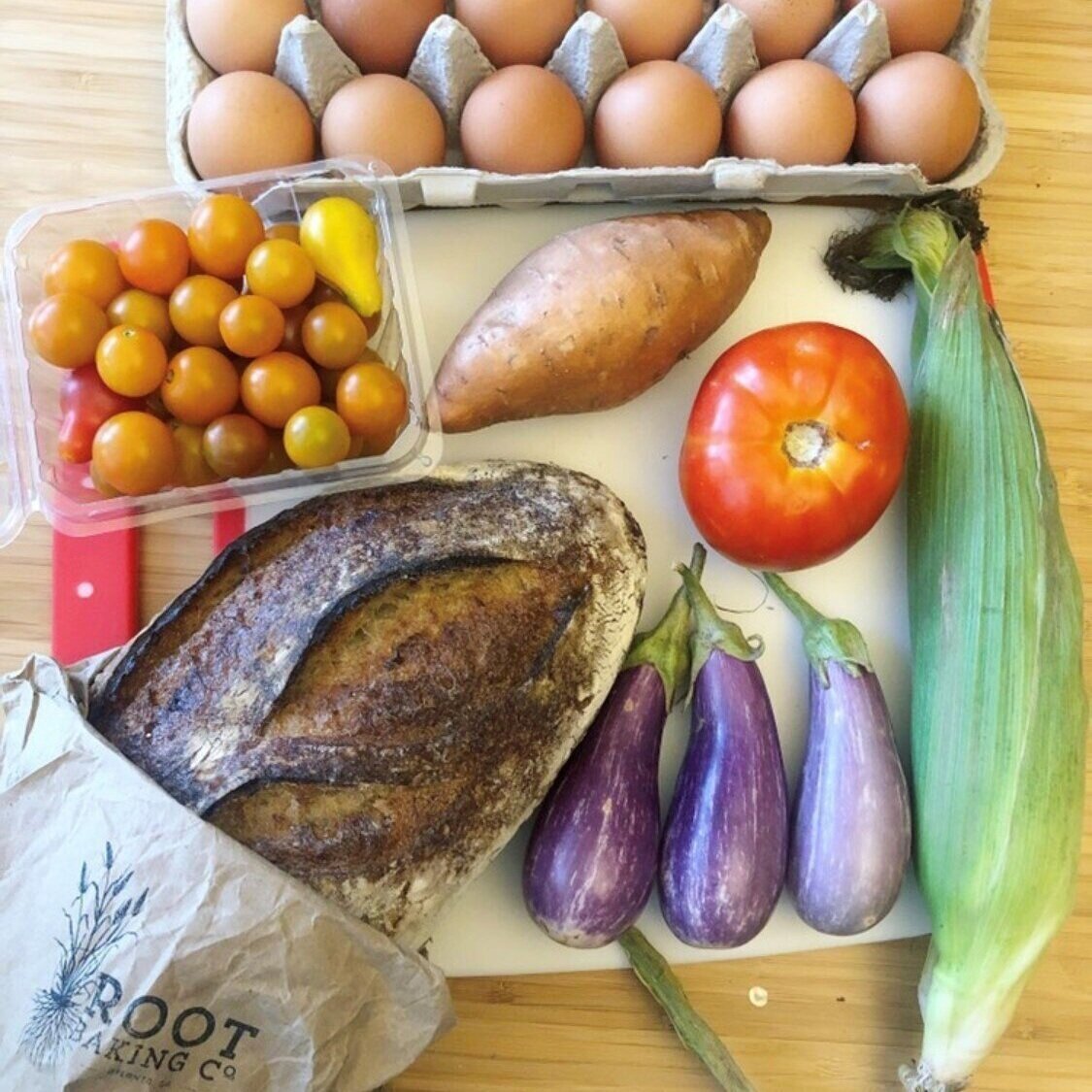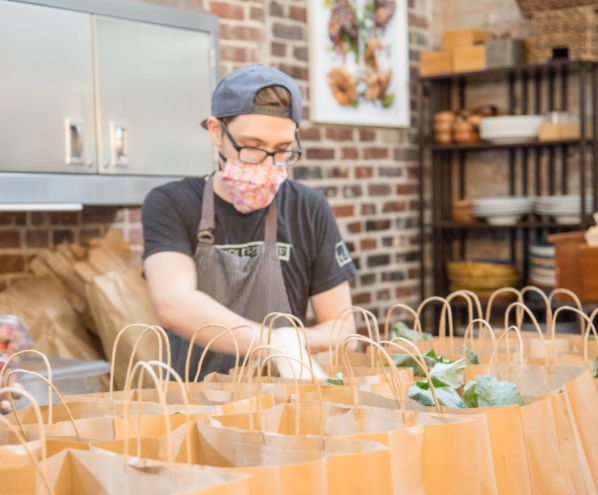farmer champion
THE LATEST FROM OUR FARMER CHAMPION PROGRAM
When Georgia Organics created the Farm to Restaurant program in 2019 our goal was to connect farmers to chefs as a way to move product. Although we knew there were restaurants doing this type of sourcing, we quickly (and happily!) discovered that many more chefs and farmers already had these deep connections. Our goal, afterward, became two-fold: to continue introducing farmers to chefs while simultaneously highlighting the incredible relationships that already exist within the Georgia food community. From this idea came the Farmer Champion campaign and the decals you’ll start to see popping up on restaurant windows around the state.
After two years of working with over 20 restaurants in the program, we’re excited to award the Top 3 restaurants in two categories: Local and Organic Spend, for going above and beyond in their sourcing from Georgia farmers.
Are you a farmer that sells to farmers’ markets or have a CSA but are ready to get into the wholesale market, either to restaurants or institutions? Luckily, we have some tips for you! On Thursday, February 26th, Lauren Cox, Organic Procurement Coordinator at Georgia Organics along with Zac Harrison, owner of Fresh Harvest, and Neil Ringer, Director of Operations of The Common Market Southeast shared knowledge on what the processes look like to enter the wholesale market in Georgia in a variety of ways.
Small farms operate much like other small entrepreneurial businesses. In addition to producing food, a farmer must also be a self-promoter, a marketer, their own research and development team, and very often juggle the wants and needs of a variety of customers. In the 6th installation of the Winter Webinar series, Farm to Restaurant’s Organic Procurement Coordinator leads a three-part webinar covering these activities: deciding on your basket of goods and services and creating a value statement, managing your weekly farm flow, and understanding how you divide up your farm based on your revenue streams.
Farm to Table restaurant dining has had its ups and downs as popularity goes. From becoming a hallmark of California cuisine in the 1970s to reaching its zenith and broader accessibility in the early 2000s, the farm to table narrative of freshly cut greens brought in from bucolic fields to clean kitchens and hip restaurants was all the rage. Chalkboards went up, farm names were thrown around, and eaters felt empowered in thinking they knew where their money went.
So what are the questions and indicators of an authentic farmer-chef relationship and how do you know when farm to table means more than just the moniker?
Read on as Lauren Cox, who leads our Farmer Champion campaign, explores the meaning of this often overused phrase and why recognizing meaningful farm to restaurant partnerships is so important.
Welcome back to another year of conversations with farmers, chefs, community activists, and other food leaders around Georgia!
On today’s episode, we’re connecting with a farmer-chef duo who participated in our Farm to Restaurant program’s Food Fight GA initiative: Chef Deborah VanTrece of Twisted Soul Cookhouse & Pours and Howard Berk of Ellijay Mushrooms.
In our second segment, we’re talking to Nicolas Donck and Jeni Jarrard of Crystal Organic Farm. Nicolas established Crystal Organic Farm over 27 years ago and the 175 acre farm, located about an hour outside of Atlanta, has been certified organic ever since.
On Wednesday, April 26, just over a month after the pandemic took full effect in Georgia, Georgia Organics launched a weekly market with online ordering from small, local farms and COVID-safe, touchless pick-up at Wrecking Bar Brewpub in Inman Park.
When the Georgia Organics Mid-Week Pop-Up Market ended for the season on Wednesday, Dec. 2, the overall performance was assembled alongside best practices and learnings and shared via a Good Food for Thought webinar with a community of interested attendees. Georgia Organics believes this is a market model that individuals and cooperatives in Georgia and beyond can replicate to foster farmer prosperity in their respective communities.
Farm to Restaurant In Conversation: Local Lands and Arnette's Chop Shop
If you know Local Lands and Atlanta Harvest, then you know that these two farms, owned and operated by the Ysrael family, make up a deeply-rooted and community-based part of our Georgia good food community. It may come as a surprise to discover that it was less than 10 years ago—2010, to be exact—when they packed their bags in Pennsylvania and moved down South.
This tidbit of knowledge was a common thread and bonding point for Arnette’s Chop Shop chef and owner Steven Herman the first time he was approached by Asa Ysrael to see if he was interested in sourcing local produce for the restaurant. “We instantly bonded over being Georgia transplants and our relationship has continued to deepen ever since.”
Georgia Organics Farmer Services Coordinator Kayla Williams recently spoke to Melissa Nisbet of Four Bellies Farm and Tyler Haake, Executive Chef of Atlanta’s Argosy via Zoom (interview below) to explore their farmer-chef partnership and participation in the Farmer Fund Accelerator program and the Farm to Restaurant Farmer Champion program, respectively.
In mid-March of this year, as the full effects of COVID-19 set in, Georgia’s small, locally-owned restaurants were among the hardest hit businesses to suffer from pandemic-related closures.
Farmers also felt the blow of closures, as this crucial revenue stream dried up almost overnight as orders for weekly menus ceased.
But Chris Wilkins of Atlanta’s Root Baking Co. wasn't willing to sit by as these two vital groups were left high and dry by unprecedented times. So, with a big idea and a call for extra hands, he reached out to the team at Ponce City Market and Jamestown Properties as well as Lauren Cox, Georgia Organics’ Organic Procurement Coordinator, who leads the Georgia Organics’ Farm to Restaurant program. Together, Food Fight GA was born.
Lauren Cox, who leads Georgia Organics’ Farm to Restaurant program, recently spoke to Russell Brydson of Narrow Way Farm and Chris Wilkins of Root Baking Co. to catch up with this farmer-chef duo about their involvement in Georgia Organics, plus life and business during the pandemic. Both Russell and Chris are leading participants in the Food Fight GA initiative and the Farmer Cohort and Farmer Champion programs, respectively.
Narrow Way is a member of the 2020 Farmer Fund Accelerator Program as well as a 2019 veteran of the Farm to Restaurant Farmer Cohort, and it was through this program that Russell and Chris Wilkins of Root Baking Co. first began their farmer-chef partnership, thanks, in part, to a Farm to Restaurant Farmer-Chef Speed Dating-Style Mixer.
georgia organics launches farmer champion campaign
“Farm to table” should be a commitment, not a marketing gimmick.
That’s why Georgia Organics launched its Farmer Champion campaign to quantify “farm to table” through food purchasing percentages, to create transparency around the marketing of “farm to table” and to recognize Georgia restaurants that consistently invest in Georgia farmers as part of their purchasing culture.
Bridging the gap between farms and RESTAURANTS
Lauren Cox’s passion for food started at home.
Growing up in a food-centric family, food was always a point of connection to culture and identity.
“There's a deep mutual respect between a chef that supports a farm and the farmer that sees what they grew transformed into something really beautiful and thoughtful on a plate…”
Eight reasons to eat locally today
Fall is here at last, allowing metro Atlantans to enjoy its changing colors, cool, crisp breezes—and seasonal, organic and locally sourced fare from restaurants and farmers taking part in Georgia Organics’ Farm to Restaurant Campaign, which brings local farmers and chefs together, allowing restaurants to source fresh, healthy ingredients from across the state—and for small, local farms to place their products in front of thousands of customers.























